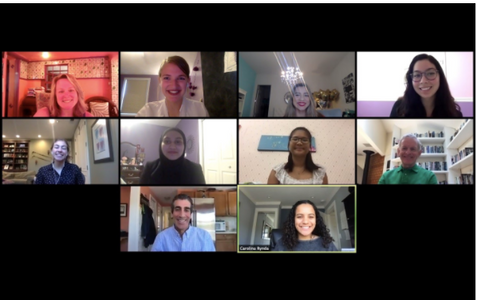2020 Capstone Award Winners
In a spring marked by the COVID-19 pandemic and the historic decision to switch to remote classes, CGS students persevered in completing the Capstone project, the 50-page essay and oral defense that marks the end of sophomore year. Students tackled Capstone virtually, meeting with teams dispersed across the globe and presenting their oral defenses via Zoom to discuss topics as timely and relevant as voter turnout in Georgia and improving maternal health care for women of color. The following teams are this year’s award recipients for their exceptional work amid exceptional circumstances.

Team R: Combating Food Deserts: Introducing Aquaponic Farms to South Side Chicago
Team R’s winning Capstone group—Brianna Aldea, Juliana Alonso, Caroline Birdsall, Wesley Carty, Kaileen Germain, and Eesha Gholap—analyzed the issue of food deserts in Chicago’s South Side neighborhood and provided a proposal to counter this major public health problem. They researched the historical, geographical and demographic information needed to come up with an innovative solution: aquaponic farms within neighborhoods. Team R faculty described the team’s defense skills “with great skill at the oral defense, with all members of the group displaying deep understanding of the complexities of food distribution in economically disenfranchised neighborhoods.”
Team S: A Policy Recommendation Prepared by Joe Biden’s Task Force on Russian Cyber Aggression for the Likely Next President of the United States
Team S’s winning Capstone group—Henry Brennan, Belize Combs, Kyla Denisevich, Sofia Dipilla, Mary King and Catherine Norton—developed a feasible multi-level solution as presidential candidate Joe Biden’s Task Force on Russian Cyber Aggression. The team proposed a voting policy regarding voting to prevent Russian interference. Team S faculty “commend the students in this group for their exceptionally successful Capstone project, and we urge them to send their paper to Washington if Biden is able to defeat Trump (and Putin) in November.”
Team T: Disinfect Your Vote: Securing Voter Turnout in Georgia’s 2020 General Election
Team T’s winning Capstone team—Cammy Brits, Haleigh Drew, Kelly Pena, Mariah Rodriguez, Faith Rynda, Humna Siddiqi and Ashlyn Silva—created a voter information campaign to expand voter turnout for the 2020 Georgia general election which took into consideration the COVID-19 outbreak. The team developed targeted advertising as well as a list of specific advice for the Georgia state government in terms of increasing voting access for the future. Team T faculty thought their proposal “was inventive, pragmatic, and (as are the best of solutions) commonsensical. Recognizing how onerous it might be to encourage change in legislation any time in the near future, they focused their efforts on a direct-mail component that equips individuals with “voter packages” and important election materials.”
Team U: Proposed Regulation of Gene Editing in Humans
Team U’s winning Capstone team—Rebecca Loo, Lorena Magana, Philip Penabella, Caitlin Pianka, Sara Segal and Priya Tewani—prepared a new national Institute of Genome Editing for CRISPR-Cas9 technology to prevent the potential abuse of unnecessary genome editing. They were able to summarize the policy in this field internationally and domestically. Team U faculty said, “Overall, this group exemplifies the best practices of what a great academic exercise the Capstone can be for learning.”
Team V: AI, Automation, & the U.S. Economy
Team V winning Capstone team—Susan Aguilar, Seena Bee, Riley Cavanaugh, Aubrey Franzo, Kara Pepper, Sydney Pickering and Morgan Serughetti—addressed the US economic benefits of AI and AI-driven automation while also minimizing the social impact of job displacement caused by the technology advancement. The team explained the impact of past technology advancement and used their research to recommend a set of policies to deal with AI-driven automation. Team V faculty commented that the group’s “camaraderie and regard for its members were evident in the professional manner with which they conducted themselves throughout the entire Capstone process. They added a lively good-humored Zoom aesthetic flourish to an early required meeting, a fun touch that showed trust in their faculty without detracting from their academic seriousness and focus.”
Team W: China and its Future Food Security
Team W’s winning Capstone team—Mingkai Sun, Hanyu Wang, Yuqing Wang, Zihuang Wu, Qianye Yin, Xinyi Zhai and Haoyu Zhang—confront the need to guarantee food security in China while environmental and governmental factors reduce the amount of viable space. They not only analyzed methods of food security, they also used their research as the basis to create a policy recommendation. Team W faculty wrote, “ their Capstone was clear, well researched and presented a well thought out solution.”
Team W: Recommendations for Improving the Maternal Mortality Rate for American Women of Color
Team W winning Capstone team—Stephen Bernard, Meredith Correia, Alexis Gomes, Ioannis Michaelidis, Aidan Moger, Sonia Rubeck and Gladys Vargas—explored maternal mortality rates for women of color in the United States. While they examined factors that contribute to the disparity, they also provided a solution that dealt with macro and micro level recommendations. Team W faculty noted that “their Capstone incorporated extensive research, was well written, and presented a clear and thoughtful solution.”
Team Y: The Hypothetical Trial of Edward Snowden and the Debate of Democracy vs. Security in U.S. Society
Team Y’s winning Capstone group—Ryan Falzon, Camille Hall, Gabrielle Patterson, Avithej Reddy, Bethany Salah, and Aaron Velasco—focused on creating a verdict for a hypothetical trial for two men, one a whistleblower and one who endangered national security. The purpose of the trial was to show the conflict between the transparency merited by open societies and the secrecy necessary for national security. Team Y faculty wrote, “The students had some fun but their legal research was worthy of law review editors and the arguments for the prosecution and defense were professional and passionate.”